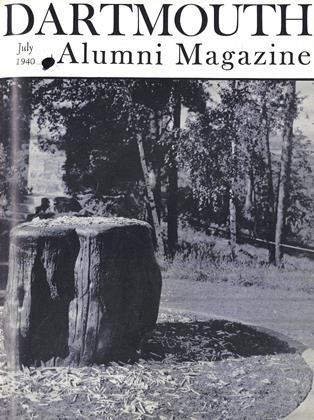By Harwood L. Childs '19. John Wileyif Sons, New York, 1940, 151 pp. $1.75.
In this book, Professor Childs undertakes a two-told task: (r) "to present a theory of public opinion which will serve as a frame of reference for public officials, political leaders, business executives, labor leaders, and group leaders generally who are today at grips with public relations problems; (2) to clarify the meaning of such terms as public relations, public opinion, public interest, and propaganda, and to appraise the role of certain institutions and practices in the public opinion arena."
The book, a well-ordered compilation of a group of lectures that Professor Childs has delivered at different times and places, unfolds itself in accordance with his two-fold purpose. The argument runs briefly as follows: Public relations are "those aspects of our personal and corporate behavior which have a social significance."
Due to inability or unwillingness to assume a social responsibility for our actions, the problem o£ adjusting our relations to the broader aspects of social change arises. This the author considers as the basic problem of public relations. This problem could be solved only if our actions were attuned to the public interest. But what is the public interest? Consult public opinion, says the author; and he proceeds to tell how, where, and why public opinion could and should be detected with specific references to such opinion "detectors" as Fortune and the Gallup Institute.
The argument is continued with particular emphasis on the forces that mould public opinion. Propaganda is thus discussed both as a "concept" and an "art." As an art, it is first related to dictatorship; later, to democracy. The danger that propaganda may be used to mislead the public as to what its basic interest really is, is imminent in dictatorship, never present in a democracy. In the latter, the tree competition between contrary propagandas serves as an effective check
against any possible distortion of public opinion, and misunderstanding of the public interest.
The book is obviously a defense of the democratic way, and it should be of interest to the general reader as well as the various group leaders in our society whom Professor Childs had primarily in mind in writing it.
 View Full Issue
View Full Issue
More From This Issue
-
 Article
ArticleCommencement Climax of 171st Year
July 1940 -
 Class Notes
Class NotesThirtymen Celebrate With Record 265 Reuners
July 1940 By BUD FRENCH '30 -
 Class Notes
Class NotesThirtieth Reunion of 1910
July 1940 By H. P. HINMAN -
 Class Notes
Class NotesGreat Twenty-Fifth for 1915
July 1940 By DONALD C. BENNINK -
 Article
ArticleBaccalaureate, 1940: The Upright Man
July 1940 -
 Article
ArticleDartmouth Remembers' Craven
July 1940
Michael Choukas '27
Books
-
 Books
BooksAlumni Notes
March 1948 -
 Books
BooksSEVENTY DARTMOUTH POEMS.
MARCH 1971 By A. INSKIP DICKERSON JR. '56 -
 Books
BooksSOCIAL DISORGANIZATION
May 1941 By Erville B. Woods -
 Books
BooksFINDING THE NEW WORLD
December 1935 By Harry B. Preston '05 -
 Books
BooksTHE BLACK LILY
July 1951 By Herbert F. West '22 -
 Books
BooksDOUBLE TAKE.
FEBRUARY 1972 By JOHN HURD '21



